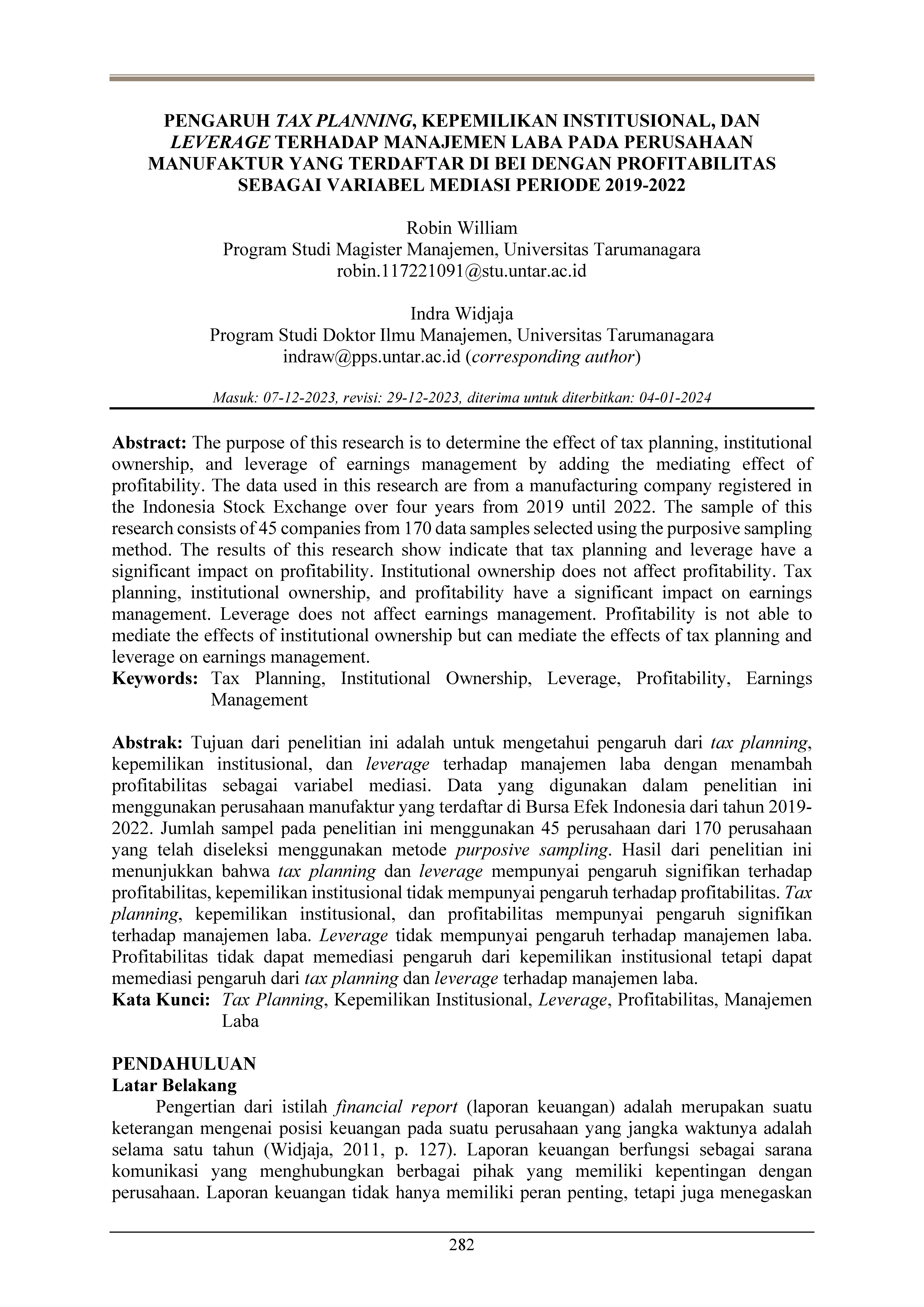Pengaruh tax planning, kepemilikan institusional, dan leverage terhadap manajemen laba pada perusahaan manufaktur yang terdaftar di BEI dengan profitabilitas sebagai variabel mediasi periode 2019-2022
Main Article Content
Abstract
The purpose of this research is to determine the effect of tax planning, institutional ownership, and leverage of earnings management by adding the mediating effect of profitability. The data used in this research are from a manufacturing company registered in the Indonesia Stock Exchange over four years from 2019 until 2022. The sample of this research consists of 45 companies from 170 data samples selected using the purposive sampling method. The results of this research show indicate that tax planning and leverage have a significant impact on profitability. Institutional ownership does not affect profitability. Tax planning, institutional ownership, and profitability have a significant impact on earnings management. Leverage does not affect earnings management. Profitability is not able to mediate the effects of institutional ownership but can mediate the effects of tax planning and leverage on earnings management.
Tujuan dari penelitian ini adalah untuk mengetahui pengaruh dari tax planning, kepemilikan institusional, dan leverage terhadap manajemen laba dengan menambah profitabilitas sebagai variabel mediasi. Data yang digunakan dalam penelitian ini menggunakan perusahaan manufaktur yang terdaftar di Bursa Efek Indonesia dari tahun 2019-2022. Jumlah sampel pada penelitian ini menggunakan 45 perusahaan dari 170 perusahaan yang telah diseleksi menggunakan metode purposive sampling. Hasil dari penelitian ini menunjukkan bahwa tax planning dan leverage mempunyai pengaruh signifikan terhadap profitabilitas, kepemilikan institusional tidak mempunyai pengaruh terhadap profitabilitas. Tax planning, kepemilikan institusional, dan profitabilitas mempunyai pengaruh signifikan terhadap manajemen laba. Leverage tidak mempunyai pengaruh terhadap manajemen laba. Profitabilitas tidak dapat memediasi pengaruh dari kepemilikan institusional tetapi dapat memediasi pengaruh dari tax planning dan leverage terhadap manajemen laba.
Article Details

This work is licensed under a Creative Commons Attribution-NonCommercial-ShareAlike 4.0 International License.
This work is licensed under a Jurnal Manajemen Bisnis dan Kewirausahaan Creative Commons Attribution-ShareAlike 4.0 International License.
References
Abughniem, M. S., Al Aishat, M. A. H., Hamdan, A., & Weshah, S. R. (2020). Capital structure, firm growth and firm performance: Evidence from Jordan. International Journal of Innovation, Creativity and Change, 10(12), 655–667. https://www.ijicc.net/images/vol10iss12/101204_Manal_2020_E_R.pdf
Anggriani, M., & Widjaja, I. (2021). Analisis pengaruh ukuran perusahaan, leverage, profitabilitas terhadap manajemen laba pada perusahaan consumer goods industry. Jurnal Manajemen Bisnis dan Kewirausahaan, 5(1), 5–9. https://doi.org/10.24912/jmbk.v5i1.10181
Assidi, S., Aliani, K., & Omri, M. A. (2016). Tax optimization and the firm’s value: Evidence from the Tunisian context. Borsa Istanbul Review, 16(3), 177–184. https://doi.org/10.1016/j.bir.2016.04.002
Chen, H., & Volpe, R. P. (1998). An analysis of personal financial literacy among college students. Financial Services Review, 7(2), 107–128. https://doi.org/10.1016/s1057-0810(99)80006-7
Lin, Y. R., & Fu, X. M. (2017). Does institutional ownership influence firm performance? Evidence from China. International Review of Economics and Finance, 49, 17–57. https://doi.org/10.1016/j.iref.2017.01.021
Mendoza, J. A. M., Yelpo, S. M. S., Ramos, C. L. V., & Fuentealba, C. L. D. (2020). Effects of capital structure and institutional–financial characteristics on earnings management practices: Evidence from Latin American firms. International Journal of Emerging Markets, 16(3), 580–603. https://doi.org/10.1108/IJOEM-03-2019-0239
Moslemany, R. El, & Nathan, D. (2019). Ownership structure and earnings management: Evidence from Egypt. International Journal of Business and Economic Development, 7(1), 18–32. https://ijbed.org/cdn/article_file/2019-04-02-10-19-34-AM.pdf
Rad, S. E. M., Salehi, H., & Pour, H. V. (2016). The impact of audit quality and ownership structure on earnings management of listed firms on Tehran stock exchange. International Business Management, 10(10), 1827–1832. https://doi.org/10.3923/ibm.2016.1827.1832
Reyna, J. M. S. M. (2018). The effect of ownership composition on earnings management: evidence for the Mexican stock exchange. Journal of Economics, Finance and Administrative Science, 23(46), 289–305. https://doi.org/10.1108/JEFAS-01-2017-0011
Selviani, & Widjaja, I. (2017). Analisis pengaruh mekanisme good corporate governance, leverage, dan ukuran perusahaan terhadap tindakan manajemen laba pada perusahaan manufaktur yang terdaftar di Bursa Efek Indonesia tahun 2014-2016. Jurnal Manajemen Bisnis dan Kewirausahaan, 1(1), 141–149. https://doi.org/10.24912/jmbk.v1i1.4763
Tartono, C. L., Hidayat, A. A., & Haryono, L. (2021). The effect of tax planning and temporary difference to earnings management. Journal of Applied Accounting and Taxation, 6(2), 183–195. https://doi.org/10.30871/jaat.v6i2.3290
Watts, R. L., & Zimmerman, J. L. (1978). Towards a positive theory of the determination of accounting standards. The Accounting Review, 53(1), 112–134. https://www.jstor.org/stable/245729
Widjaja, I. (2011). Dampak ukuran degree of financial leverage, sales growth, dan size growth terhadap return harga saham. Media Riset Bisnis & Manajemen, 11(2), 126–139. https://doi.org/10.25105/mrbm.v11i2.1098
Widjaja, I., Arifin, A. Z., & Setini, M. (2020). The effects of financial literacy and subjective norms on saving behavior. Management Science Letters, 10(15), 3635–3642. https://doi.org/10.5267/j.msl.2020.6.030


